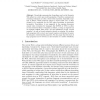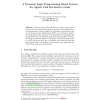1036 search results - page 79 / 208 » Incompleteness of Behavioral Logics |
AGP
1994
IEEE
14 years 28 days ago
1994
IEEE
Kowalski and Sergot's Event Calculus (EC) is a formalism for reasoning about time and change in a logic programming framework. From a description of events which occur in the...
ESWS
2006
Springer
14 years 14 days ago
2006
Springer
Knowledge representation formalisms used on the Semantic Web adhere to a strict open world assumption. Therefore, nonmonotonic reasoning techniques are often viewed with scepticism...
IJCAI
2003
13 years 10 months ago
2003
Query answering over commonsense knowledge bases typically employs a first-order logic theorem prover. While first-order inference is intractable in general, provers can often b...
LPNMR
2009
Springer
14 years 3 months ago
2009
Springer
We consider random logic programs with two-literal rules and study their properties. In particular, we obtain results on the probability that random “sparse” and “dense” pr...
DALT
2006
Springer
14 years 14 days ago
2006
Springer
Goals are used to define the behavior of (pro-active) agents. It is our view that the goals of an agent can be seen as a knowledge base of the situations that it wants to achieve. ...


